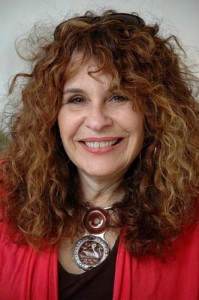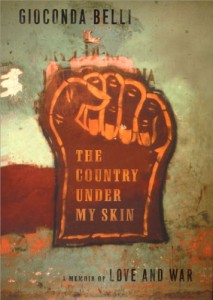Interview with Nicaraguan Writer Gioconda Belli
by Elizabeth Hoover / May 23, 2011 / 1 Comment
“Ortega has played at democracy but doesn’t have a democratic bone in his body.”
Photo by Margarita Montealegre
“Nicaragua is a farce,” writer Gioconda Belli told the New York Daily News in 2009. Belli is recognized not only for her outspoken criticism of Daniel Ortega’s government; she is also one of Central America’s best-known writers of poetry and prose.
In her early 20s, Belli joined the Sandinista National Liberation Front (FSLN) and was forced into exile. When the FSLN overthrew the Somoza dictatorship in 1979, she returned to work in government, primarily in communications. But in 1993, she broke with the FSLN and became an outspoken critic of party leader Ortega, who had been voted out of office in 1990. He was re-elected in 2006 and has been accused by critics—Belli included—of being a dictator and totalitarian.
Throughout her career, Belli’s writing and her politics have been inextricably linked. Her poetry and fiction celebrate sensual love, motherhood and femininity, but also revolutionary politics and the ideal of working together for a more just society.
Her first novel, the 1988 La Mujer Habitada (The Inhabited Woman), is a semi-autobiographical tale of a young woman struggling to define herself within the underground Sandinista movement despite objections from her lover. Her autobiography El país bajo mi piel (The Country Under my Skin) was a finalist for the 2003 Los Angeles Times Book Prize. In 2008 she received the Biblioteca Breve Award for her book El infinito en la palma de la mano (Infinity in the Palm of Her Hand. Her most recent novel, El país de las mujeres (A Woman’s Country), was published in 2010. Her writing has been translated into several languages, including French, English, Italian, German, Turkish, Greek, Dutch, Chinese and Finnish.
Belli, who divides her time between Los Angeles, California, and Managua, Nicaragua, recently participated in the PEN World Voices Literary Festival, which took place April 25-May 1 in New York City.
In this interview conducted via email, Belli reflects on the legacy of the Sandinista movement, her hopes for Nicaragua, and the state of freedom of expression under Ortega.
Your most recent novel El país de las mujeres (A Woman’s Country) tells the story of a group of women who start their own political party and manage to take over the government, in part because a volcanic eruption reduces testosterone levels in men. What inspired you to write this story?
In the 80s, during the Sandinista Revolution, a group of women, me included, began to meet secretly to figure out ways to introduce the discussion of women’s issues into the revolutionary agenda that, at the time, was mostly occupied with economic and military concerns. We called ourselves the Party of the Erotic Left, PIE, which means “foot” in Spanish. It was a defiant and fun group. I took the inspiration for this novel from that experience. The novel is a political satire. After women win the elections, they send men home to rest because they are convinced that with men around they won’t be able to change the rules of the political game. The drop in testosterone levels serves as a good excuse for this.
After the fall of the dictator Somoza in 1979, you worked in the government as the first director of the State’s TV Station and then in other roles. But you eventually broke with the government and became and outspoken critic of the Ortega regime. Why?
I left the FSLN in 1993. After the 1990 electoral defeat, many of us questioned Daniel Ortega’s leadership and demanded that the party democratize itself and adjust to a different world. He wouldn’t hear of it and began a campaign to make everybody who criticized him suspect of trying to divide and break the FSLN. He managed to generate sympathy for himself among the rank and file and isolate us. At some point a large number of us left the FSLN. Since then, Daniel Ortega has ruled the party with an iron fist and stifled any kind of dissent. He has turned the FSLN into his personal fiefdom.
He has played at democracy but doesn’t have a democratic bone in his body. Currently he has managed, in the five years he’s been in power, to disassemble the institutional foundations of the country and return to a party-run state, where he calls all the shots. He’s learnt to be more sophisticated and keep a semblance of democracy, but it is just a facade
Ortega is perhaps best known for election fraud and manipulating the constitution. But he has also cracked down on the media and harassed dissidents. What is the climate like in Nicaragua for journalists and writers? How does Ortega regulate freedom of expression?
The state extends licenses to the media. If they do not behave, they can have their licenses suspended. That is how he’s managed to control TV stations. His family has begun buying TV stations. They already own three main channels and have a large percentage of shares of another. Ortega’s sons are in charge of these TV stations. The government also uses tactics like tax audits and rising import tariffs on paper and other resources needed by the media. They limit the access of independent media to press conferences and news, and they do not allow government functionaries to speak to independent media. Daniel Ortega has not given a single interview to a Nicaraguan journalist since he became president five years ago.
Have you faced any repercussions for your criticism of the government? How have other writers who have spoken out against Ortega faired? I’m thinking specifically about Ernesto Cardenal.
Repercussions are disguised as other kinds of problems: Ernesto Cardenal faced a legal suit and had his checking accounts frozen for more than two years.
Ernesto Cardenal once said that the “one who is really running things in the country” is Rosario Murillo, and writer Horacio Castellanos Moya refers to her metaphorically as “Lady Macbeth.” What sort of power do you think she has?
She is the power behind the throne. Our constitution rules that Presidential relatives cannot occupy high positions in government, but she is the head of the Councils of the Citizen’s Power (a copy cat of Venezuela’s grass roots government organizations), the head of the Social Cabinet, the Head of Government Communications, the Government’s Spokesperson, and the Head of State and Party propaganda.
In 2003, you told Salon.com that you created a better Nicaragua for your children because of “the fact that there’s no repressive army, there’s freedom, there’s democratic possibilities.” In October 2009, the Supreme Court certified Ortega so that he would be able to run for re-election in 2011. This alters the constitution, which prohibits consecutive terms. Do you still see democratic possibilities in Nicaragua? How can these possibilities be realized?
Unless Ortega is stopped somehow from becoming President again, we are doomed to relive another cycle of a dynastic family running the country for many years to come. The democratic gains that were so hard won by the Nicaraguan people are going to be inevitably lost. Even the independence of the army and the police are at this point at risk. Already the police are behaving like a party apparatus. The next in line to substitute the current chief of police has a family relation with Ortega because his daughter is married to one of Ortega’s sons.
Does Ortega have a chance of winning (in a democratic way, not by fraud) the elections?
The electoral process has been too corrupted to predict a realistic outcome.
Do you still think the revolutionary vision of the Sandinistas you joined as a young woman can still be realized? What will it take and how will writers be a part of that project?
I believe my generation did the right thing getting rid of the Somoza dictatorship, but history is a long process and usually dreams do not become fulfilled in one’s short life time. Speaking truth to power is what we writers have to do because history has taught us that however long it takes, people sooner or later, listen and act.
Read Elizabeth’s bio.







One Comment on "Interview with Nicaraguan Writer Gioconda Belli"
Great interview. Thanks.